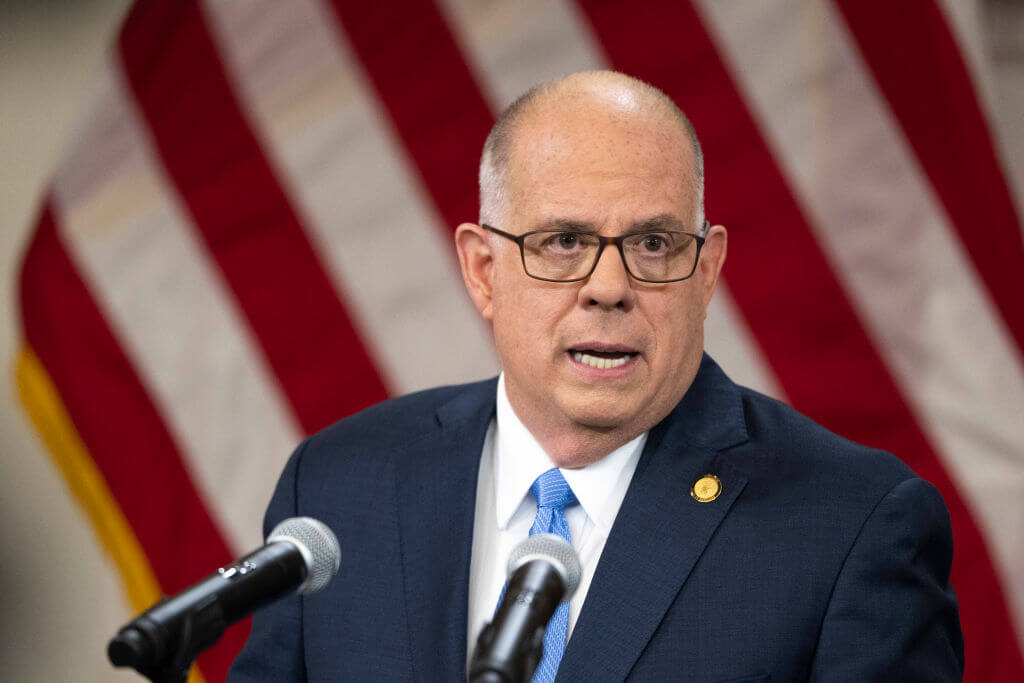Former Maryland governor ditches Harvard gig, citing school’s tepid response to Israel war and antisemitism
“Harvard’s failure to immediately and forcefully denounce the antisemitic vitriol from these students is in my opinion a moral stain on the university,” wrote Larry Hogan.

Maryland Governor Larry Hogan at a news conference on August 5, 2021 in Annapolis, Maryland. Photo by Getty Images
Former Maryland Gov. Larry Hogan informed Harvard University on Monday that he would no longer participate in a fellowship that brought high-profile leaders to campus to lead workshops with students, because he said the school was not doing enough to combat antisemitism on its campus.
“I cannot condone the dangerous antisemitism that has taken root on your campus, especially by more than 30 Harvard student organizations attempting to justify and celebrate Hamas’ terrorism against innocent Israeli and American civilians,” Hogan wrote in a letter to Harvard president Claudine Gay, which Hogan shared on X, the social media platform formerly known as Twitter.
He added: “This horrific terrorist attack was the greatest loss of Jewish life since the Holocaust and it should be universally condemned as exactly what it is: pure evil. While these students have a right to free speech, they do not have a right to have hate speech go unchallenged by your institution. Harvard’s failure to immediately and forcefully denounce the antisemitic vitriol from these students is in my opinion a moral stain on the university.”
Hogan, a moderate Republican, was scheduled to teach this fall at the Kennedy School of Politics and the Chan School of Public Health, both at Harvard.
At an alumni reunion event on Monday, President Gay responded: “Let me say this unequivocally – I condemn antisemitism in all forms and it has no place at Harvard. I’ve spent the last two weeks speaking to a number of members of the Jewish community here at Harvard. It is a vital and vibrant part of the university and I am 100 percent committed to making sure that Jewish life thrives here on our campus. And as I said in a statement a couple of weeks ago, and then in a video to our community, the terrorist attacks by Hamas were barbaric and abhorrent, and they have had a really wrenching impact on our Jewish community. I’ve been very mindful of that.”
She added: “We have a lot of work to do on that dimension, but it has my full attention.”
Brewing controversy
The Harvard controversy began when three dozen student groups calling themselves the Harvard Palestine Solidarity Groups published a statement holding “the Israeli regime entirely responsible for all unfolding violence.”
The group’s statement was published online hours after Hamas launched a surprise attack on Oct. 7 that killed more than 1,400 Israelis. Some of the victims were young people at a music festival; others were families living on kibbutzim near Gaza. Hamas gunmen also abducted around 220 Israelis, including seniors and children.
President Gay did not directly respond to the students’ manifesto, though she and 17 staff and faculty members later released a statement saying they were “heartbroken by the death and destruction unleashed by the attack by Hamas that targeted citizens in Israel this weekend, and by the war in Israel and Gaza now under way.”
Critics called the response tepid. Harvard’s Jewish former president, Lawrence Summers, tweeted: “In nearly 50 years of Harvard affiliation, I have never been as disillusioned and alienated as I am today.”
The Wexner Foundation, a philanthropic group focused on developing the next generation of Jewish leaders, last week ended a program that paid for Israelis to get master’s degrees at Harvard, citing the university’s “failure” to condemn Hamas.
Campus problems
Harvard is not alone among universities in facing criticism over how it has responded to the war in Gaza. The University of Pennsylvania has faced backlash from alumni and donors — including billionaire Ronald Lauder, who heads the World Jewish Congress — who have accused the school of failing to fight antisemitism on campus.
Posters of Israelis kidnapped by Hamas have been torn down at the University of Pennsylvania and many other campuses. At New York University, two young women were caught on video ripping down the flyers and one of them issued an apology after being publicly identified on social media.
Other incidents at elite schools around the country include an Israeli student attacked with a stick at Columbia University and a Stanford instructor suspended for making Jewish students stand in a classroom corner, then calling them “colonizers.” In September, a day before the University of Pennsylvania was set to host a festival celebrating Palestinian literature criticized as a forum for anti-Zionism and antisemitism, a person reported to be a student entered the campus Hillel and shouted antisemitic epithets as he ransacked the building’s lobby.
Former Gov. Hogan concluded his letter with hope that lessons could be learned: “This is not a decision I have taken lightly, but it is my hope that it may help further spur you to take meaningful action to address antisemitism and restore the values Harvard should represent to the world.
Beth Harpaz contributed to this report.
Update: This story has been updated to add comment from Harvard.
A message from our Publisher & CEO Rachel Fishman Feddersen

I hope you appreciated this article. Before you go, I’d like to ask you to please support the Forward’s award-winning, nonprofit journalism so that we can be prepared for whatever news 2025 brings.
At a time when other newsrooms are closing or cutting back, the Forward has removed its paywall and invested additional resources to report on the ground from Israel and around the U.S. on the impact of the war, rising antisemitism and polarized discourse.
Readers like you make it all possible. Support our work by becoming a Forward Member and connect with our journalism and your community.
— Rachel Fishman Feddersen, Publisher and CEO


























